External links
![]() Media related to R. E. Dennett at Wikimedia Commons
Media related to R. E. Dennett at Wikimedia Commons
Richard Edward Dennett was an English trader operating out of the Kongo (present day Republic of Congo) in the early 20th century who wrote a number of books that were influential on sociological and anthropological research on the cultures of West Africa.
![]() Media related to R. E. Dennett at Wikimedia Commons
Media related to R. E. Dennett at Wikimedia Commons
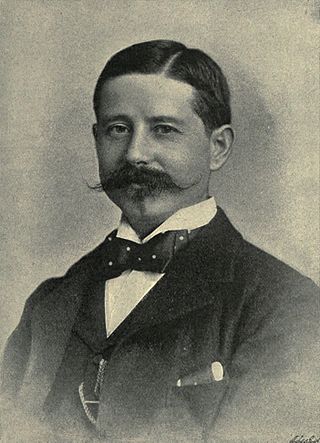
Sir Henry Hamilton Johnston was a British explorer, botanist, artist, colonial administrator, and linguist who travelled widely across Africa to speak some of the languages spoken by people on that continent. He published 40 books on subjects related to the continent of Africa and was one of the key players in the Scramble for Africa that occurred at the end of the 19th century.
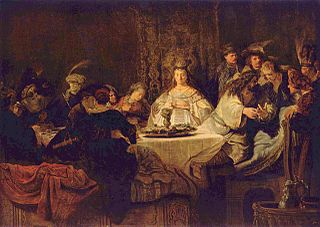
A riddle is a statement, question or phrase having a double or veiled meaning, put forth as a puzzle to be solved. Riddles are of two types: enigmas, which are problems generally expressed in metaphorical or allegorical language that require ingenuity and careful thinking for their solution, and conundra, which are questions relying for their effects on punning in either the question or the answer.

Yoruba is a language spoken in West Africa, primarily in Southwestern and Central Nigeria. It is spoken by the ethnic Yoruba people. The number of Yoruba speakers is roughly 45 million, plus about 2 million second-language speakers. As a pluricentric language, it is primarily spoken in a dialectal area spanning Nigeria, Benin, and Togo with smaller migrated communities in Côte d'Ivoire, Sierra Leone and The Gambia.
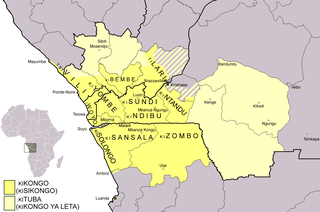
Kongo or Kikongo is one of the Bantu languages spoken by the Kongo people living in the Democratic Republic of the Congo, the Republic of the Congo, Gabon and Angola. It is a tonal language. It was spoken by many of those who were taken from the region and sold as slaves in the Americas. For this reason, while Kongo still is spoken in the above-mentioned countries, creolized forms of the language are found in ritual speech of Afro-American religions, especially in Brazil, Cuba, Puerto Rico, the Dominican Republic, Haiti and Suriname. It is also one of the sources of the Gullah language and the Palenquero creole in Colombia. The vast majority of present-day speakers live in Africa. There are roughly seven million native speakers of Kongo, with perhaps two million more who use it as a second language.
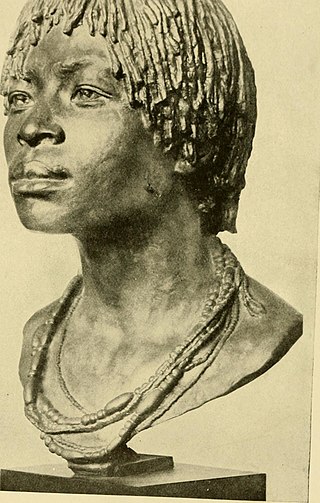
The Kongo people are a Bantu ethnic group primarily defined as the speakers of Kikongo. Subgroups include the Beembe, Bwende, Vili, Sundi, Yombe, Dondo, Lari, and others.

Islam is one of the largest religions in Nigeria and the country has the largest Muslim population in Africa. In 2018, the CIA World Factbook estimated that 53.5% of Nigeria's population is Muslim. Islam is predominantly concentrated in the northern half of the country, with a significant Muslim minority existing in the southern region. Most of Northern Nigeria is governed under Sharia law, while the rest of the country is governed under secular law.

The Kingdom of Loango was a pre-colonial African state, during approximately the 16th to 19th centuries in what is now the western part of the Republic of the Congo, Southern Gabon and Cabinda. Situated to the north of the more powerful Kingdom of Kongo, at its height in the 17th century Loango influence extended from Cape St Catherine in the north to almost the mouth of the Congo River.

George Grenfell (21 August 1849, in Sancreed, Cornwall – 1 July 1906, in Basoko, Congo Free State was a Cornish missionary and explorer.
The Folklore Society (FLS) is a registered charity under English law based in London, England for the study of folklore. Its office is at 50 Fitzroy Street, London home of the Royal Anthropological Institute of Great Britain and Ireland.
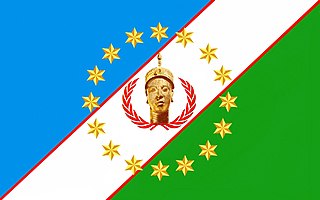
The Yoruba people are a West African ethnic group who mainly inhabit parts of Nigeria, Benin, and Togo. The areas of these countries primarily inhabited by the Yoruba are often collectively referred to as Yorubaland. The Yoruba constitute more than 48 million people in Africa, are over a million outside the continent, and bear further representation among members of the African diaspora. The vast majority of the Yoruba population is today within the country of Nigeria, where they make up 20.7% of the country's population according to Ethnologue estimations, making them one of the largest ethnic groups in Africa. Most Yoruba people speak the Yoruba language, which is the Niger-Congo language with the largest number of native or L1 speakers.
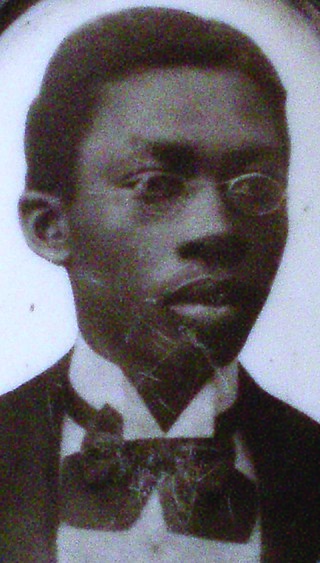
William Allen Vivour was the single most successful 19th-century planter in Africa due to his substantial and flourishing cocoa plantation in Fernando Po. He was the son of a recaptive of Yoruba ancestry and resettled in Sierra Leone by the British West Africa Squadron, and eventually settled in present day Equatorial Guinea and Nigeria.
Gbedu literally means "big drum" and is a percussion instrument traditionally used in ceremonial Yoruba music in Nigeria and Benin. More recently, the word has come to be used to describe forms of Nigerian Afrobeats music.

Herzekiah Andrew Shanu was a photographer recognized for his involvement in the campaign against abuses in the Congo Free State.

This is a list of the known kings of Loango.

Lagos Colony was a British colonial possession centred on the port of Lagos in what is now southern Nigeria. Lagos was annexed on 6 August 1861 under the threat of force by Commander Beddingfield of HMS Prometheus who was accompanied by the Acting British Consul, William McCoskry. Oba Dosunmu of Lagos resisted the cession for 11 days while facing the threat of violence on Lagos and its people, but capitulated and signed the Lagos Treaty of Cession. Lagos was declared a colony on 5 March 1862. By 1872, Lagos was a cosmopolitan trading centre with a population over 60,000. In the aftermath of prolonged wars between the mainland Yoruba states, the colony established a protectorate over most of Yorubaland between 1890 and 1897. The protectorate was incorporated into the new Southern Nigeria Protectorate in February 1906, and Lagos became the capital of the Protectorate of Nigeria in January 1914. Since then, Lagos has grown to become the largest city in West Africa, with an estimated metropolitan population of over 9,000,000 as of 2011.

The Saro, or Nigerian Creoles of the 19th and early 20th centuries, were Africans that were emancipated and initially resettled in Freetown, Sierra Leone by the Royal Navy, which, with the West Africa Squadron, enforced the abolition of the international slave trade after the British Parliament passed the Slave Trade Act 1807. Those freedmen who migrated back to Nigeria from Sierra Leone, over several generations starting from the 1830s, became known locally as Saro(elided form of Sierra Leone, from the Yoruba sàró). Consequently, the Saro are culturally descended from Sierra Leone Creoles, with ancestral roots to the Yoruba people of Nigeria.

The Sierra Leone Creole people are an ethnic group of Sierra Leone. The Sierra Leone Creole people are descendants of freed African-American, Afro-Caribbean, and Liberated African slaves who settled in the Western Area of Sierra Leone between 1787 and about 1885. The colony was established by the British, supported by abolitionists, under the Sierra Leone Company as a place for freedmen. The settlers called their new settlement Freetown. Today, the Sierra Leone Creoles are 1.2 percent of the population of Sierra Leone.
Yoruba Canadians are Canadians of Yoruba descent. The Yoruba people are an ethnic group of southwestern Nigeria and southern Benin in West Africa. They represent the second largest ethnic community of Nigerians in Canada. According to the 2016 Canadian census by Statistics Canada, 16,210 respondents spoke Yoruba at home ranking it as one of the most spoken Niger-Congo language in the country. Many are descendants of African American slaves while recent migrants come directly from West Africa.

The Vili people are a Central African ethnic group, established in southwestern Gabon, the Republic of Congo, Angola and the Democratic Republic of Congo. It's a subgroup of Bantu and Kongo peoples.
Edward Fletcher Cass was a British miner, banker and authority on Lancashire folklore, industrial archaeology and the arts who was President of the Manchester Literary and Philosophical Society, Folklore Society, Lancashire and Cheshire Antiquarian Society and Society for Folk Life Studies.